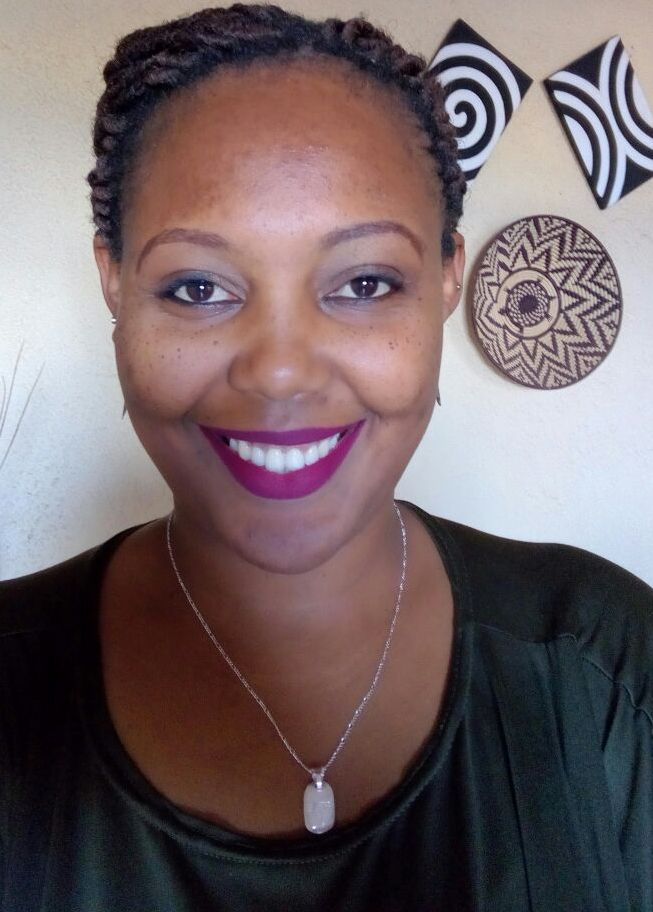The pandemic has changed an array of ways of human interaction; undoubtedly reshaping it. To some of us, home and work became one and the same - both a blessing and a curse.
Over the course of the past year, the internet quickly became a crucial element integrated in our daily lives, impacting many and shedding light on the issues we face. In Rwanda, inaccessibility, affordability and poor infrastructure are all equally contributing factors to whether someone is online or not. Rwanda invested into building a robust ICT infrastructure and ensuring internet accessibility to the majority of the population. The digitization of government services and facilitation of digital payments highly contributed to the ICT sector’s development. Nonetheless, Gender Based Violence online has wedged itself in women’s presence online. This is not just an African problem, but a global one.
In this article, I discuss women’s online participation during COVID-19, and the violence they encounter online that is challenging their active participation.
Although, the female population makes up the majority of Rwanda’s population, males top their counterparts when it comes to social media presence. Facebook has the highest number of female users, with 33.6% to 66.2% female to male users respectively. Twitter has the least number of female users at 16.2% compared to 64.3% male users. There are many factors leading to this gendered digital divide, which include access to the internet and devices, low level of digital literacy, content, and online violence to name a few.
Online behaviour often mirrors the life we live offline. With the advantage of anonymity that the internet provides, perpetrators are able to be more confident in their harmful acts. Because the harm exercised online is not physical, it is rarely considered harmful or classified as Gender Based Violence. However, the pandemic has exposed how important and impactful the internet is. It has also left no choice for many people but to migrate their work online.
I had a conversation with journalists caught up in the face of it all. Now that they are more active online, they experience and witness online abuse from the general public and their colleagues as a recurring issue.
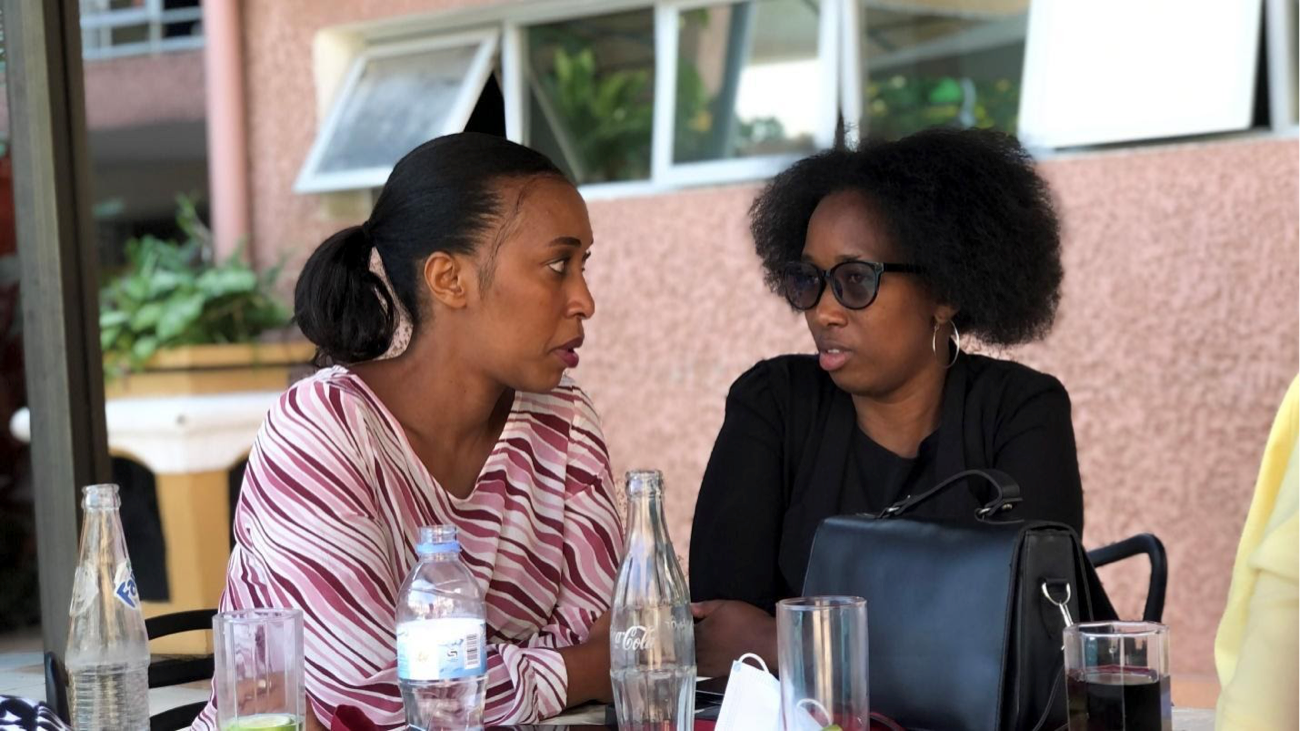
Journalists Yuyu and Marie Anne, discussing the effects of gender based violence online. Source: Fred Ndahira
Online participation: Forced Use of the Internet
In March 2020, Rwanda implemented the first total lockdown, restricting movement and allowing only essential services to operate. Only those that had government authorized permits could move freely- journalists included. Due to the nature of their jobs, journalists need facilitated movement to research, create content, broadcast and/or publish. With these restrictions, they were forced to look for alternative ways to do their job.
Most of them had to rely heavily on the internet to get their sources and publish their stories.
Marie Anne who works for The New Times – a leading newspaper in Rwanda – and Izuba, is one of the journalists I talked to who was affected by this change. She tells me “movement was not easy and even though journalists had pass cards that allowed them to move, means of transport were not easy. Even now, there are many restrictions; only 50% of workers are allowed and large meetings of more than 30 people require COVID-19 tests which are not affordable to everyone. This therefore affected our work and forced many of us to work online and use more platforms than we were using before”

Members of AEFEM during a digital media literacy workshop. Source: Doreen Mutesi
Although these journalists encountered change in their work, they were also provided with opportunities to expand their work.
“As women in media, we have had to use the internet as our source of information for the work that we do. I have also realized that women tend to use their phones a lot, be it for reading, watching videos, listening to music or news, etc., so it is only natural that we now use it for work. We were also able to obtain grants that facilitated the work that we do, and helped us keep the lights on” Jeanne Kandama, journalist.
Many explored new applications and communication channels to enhance their work and access sources and information. Yuyu Immaculee, another journalist I spoke to noted “the internet facilitated the mode of communication and those who did not have apps like WhatsApp had to download them, we had to learn how to use Zoom to communicate at work. Many opportunities were also derived from working online; we gained more sources of information and connections across different countries. We got to share how COVID-19 affected Rwandans and participated in online meetings that allowed us to share our work.”
Offline Culture’s Influence on Women’s Interaction Online
Culture and religion continue to play a major role in influencing people’s behaviors; in particular women’s, whether this is done offline or online. Women continue to be censored and are told what to do with their bodies and how to present themselves. Society treats women who do not fit the cast it has created for them very differently. For those who are bold enough to live out their lives the way they see fit, they easily become targets of harassment and bullying.
“A fellow journalist who hosts a Friday night show on one of the national TVs was one day highly criticized for how she was dancing and performing on the show. Unfortunately, the comment was started by a woman and many people joined in on mocking her.” Juventine, journalist.
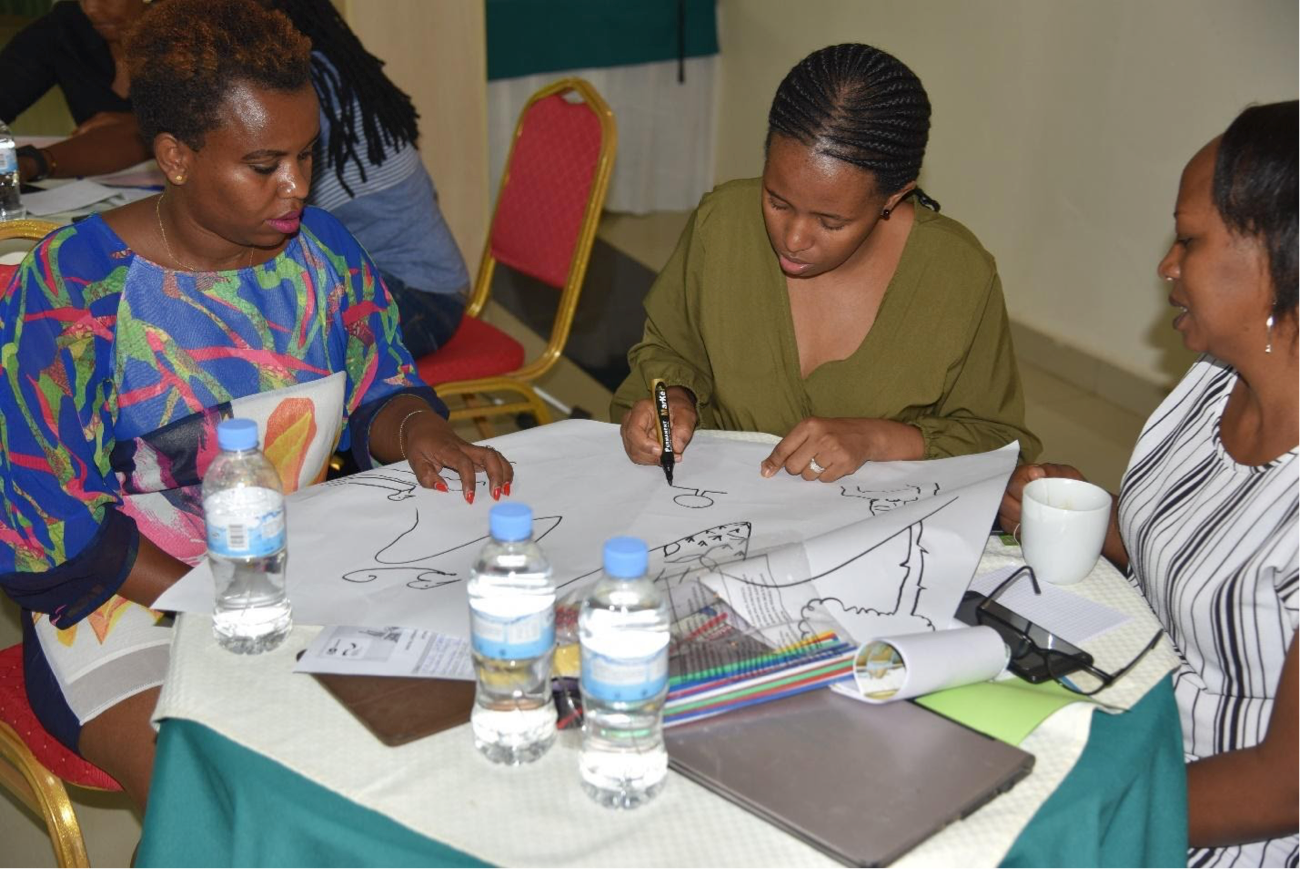
Jeanne Kandama and other journalists, during a digital media literacy workshop. Source: Doreen Mutesi
Rwandan women are expected to be meek, humble, soft spoken and to not exhibit authority. A bold woman is often called Igishegabo (a woman who has ‘male’ character), this word is given to women who take charge, who speak out on issues and have no fear during confrontations with males. Feminists and women who speak up online have become familiar with the slur Ibishegabo (plural) used to insult or critique a women’s character. Women who hold higher positions are still expected to respect men and these expectations are easily reflected in the online spaces. When women share their opinions, especially when they have opposing views to the mainstream, they are attacked and called all sorts of names.
“Many women find it easy to share their personal lives with their friends and family, however it is still very difficult to have them share opinions openly. But now, with the pandemic, they are learning to be bold and share their work.” Jeanne, journalist.
Despite the insults and bullying women experience online, sometimes their voices have been heard and issues have been solved. A minister who slapped a female security guard had to resign after the incident was brought on twitter, where people condemned him. He issued an apology on twitter and later resigned. Although, he was reinstated in the government in a different position months later, It is an example of how voices on social media can be used to obtain justice.
“Just like women shy away from speaking up in meetings, they tend to not share their opinions online. however, one of the ways they have been encouraged to do so, is when social media-especially twitter- is used to solve issues that have been unresolved offline.” Marie Anne, journalist.
Dr. Francis Habumugisha, an owner of a local TV station named Goodrich, physically assaulted one of his employees in a meeting and his victim tweeted about it, uploading a video as evidence. She had been trying to obtain justice for two months but to no avail; the video on twitter gained popularity, so much so, that the president’s attention was drawn. President Kagame promised to follow up on the issue. Dr. Habumugisha was sentenced to one year in jail and a compensation of 1,000,000 FRW to his victim Diane- yet another example of ‘online’ justice.
Cases of Online Violence
With many people joining online spaces and having more time to kill on social networks, online harassment and bullying peaked and on many occasions has gotten out of hand. Social networks have attracted all kinds of people during the pandemic and they presented all sorts of behaviour; some of which are harmful to others online and offline. The lack of regulation and censorship on the internet has led to a rise in the number of accounts (such as The Cat Vevo and Kasuku Media) which perpetrate violence in cyber spaces by targeting people and spreading misinformation.
Misogynistic behavior is also reflected and magnified online. It is widely common for women to be body-shamed; according to a survey published in a UNESCO/ICF report last year, 73% of women journalists experienced online violence in the course of their work. Online bullying, particularly based on body image, can cause long lasting effects such as emotional distress, low self esteem, social anxiety, depression, among others. Yuyu, a local journalist, has experienced cyber-bullying first-hand as a response to her articles.
“I get harassed and bullied online from the articles I share online. It is very common to be attacked on the way I look instead of people focusing on my work. Sometimes people ask for a picture of the writer and share insulting remarks.” Yuyu, journalist.
The issue goes beyond public spaces, as women face harassment and intimidation in the insitutions they work in and among their peers as Francine explains.
“The majority of media firms do not have a gender policy on sexual harassment and this creates an opportunity for male journalists to target young female journalists who are often the victims of this abuse. Even the associations and groups we belong to do not help or advocate for us. Women are bullied and intimidated by their senior colleagues on WhatsApp groups and social media.” Francine Andrew, journalist
Since I interviewed Francine, there has been a training organized on sexual harassment in the work place for Rwandan journalists and a possibility of implementing gender policies within media houses. This came as a result of many cases of sexual harassment in media, where young journalists were dropping out and changing profession due to a lack of accountability. Many organizations and associations led by women prompted gender policies in their institutions. Organizations such as Pax Press, Women Media Owners for Change and the Association of Women in Media (ARFEM) have been advocating for safe spaces for women in media and the ability for them to grow as much as their male colleagues.
Online Support System
In the midst of the violence, people created networks to help individuals find support and find solace within themselves.
Many of the women who experience abuse online or who have witnessed others being abused are comforted by the knowledge that they do not have to deal with these abuses alone. Most of them- including feminists and journalists- have created support systems within their circles and learned to stand up for themselves. Journalists we spoke to painted a vivid picture:
We have built solidarity amongst ourselves as a way of defending each other online. An example is a fellow journalist who was locked in her office when she went to ask for her payment. She sent us a message on WhatsApp and we all advocated for her online and the authorities quickly intervened and she was released. Her employer, was also held accountable. So while we have all these experiences that negatively impact us, we have also learned the power of social media and we use it to raise issues”. Jeanne Kamanda, journalist.
“While there are many negative experiences online, there is also immense support from people. these days’ people do not shy away from speaking up against an abuser.” Marie Anne, Journalist.
“I once was harassed by a male colleague who slandered my name for quite some time, I stood up to him and told him to stop. Since then he hasn’t done it again and I think this has served as a lesson for others as well.” Juventine, Journalist.
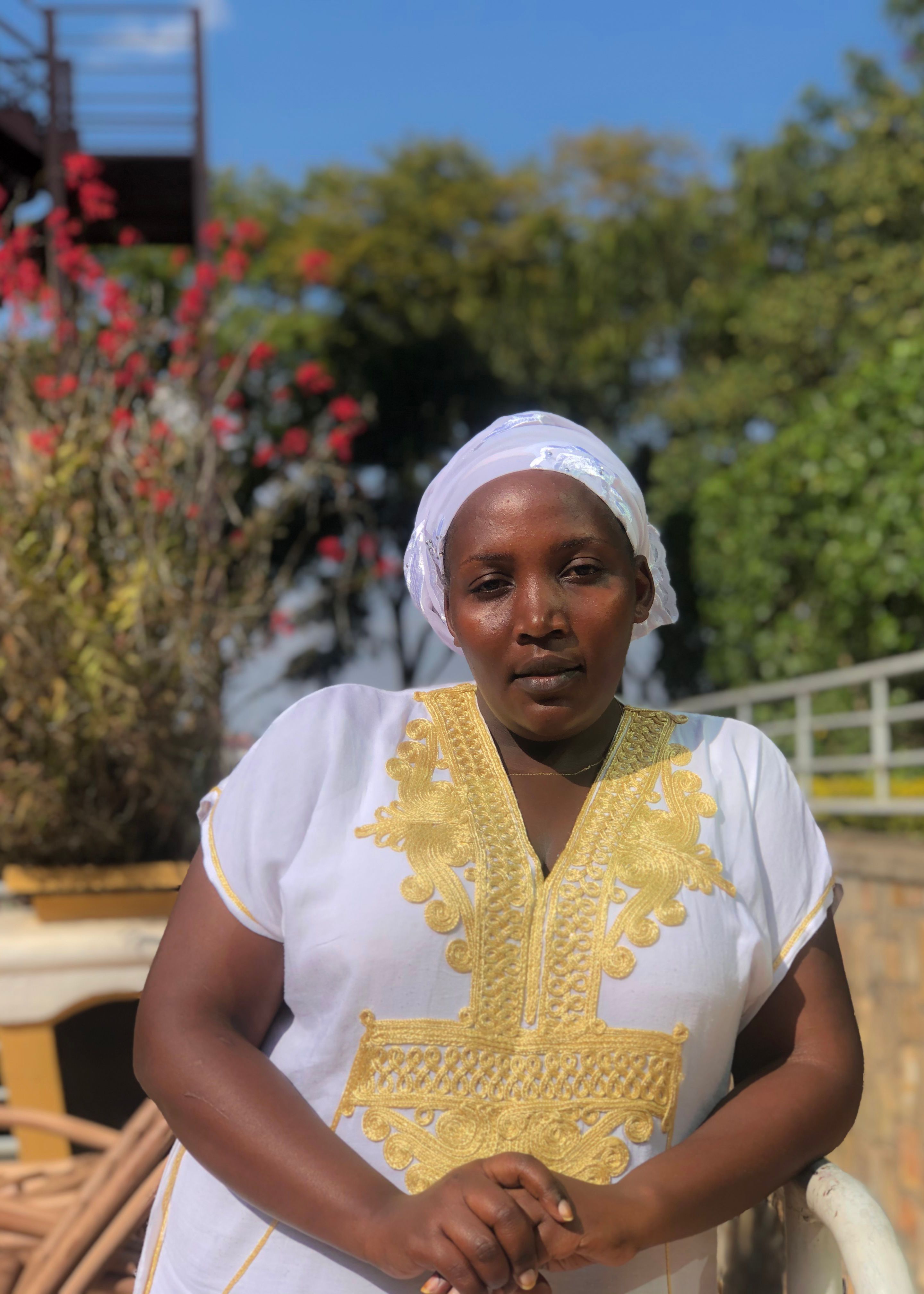
Jeanne. Source: Fred Ndahira
Legal Framework
The cyber law in Rwanda has been revised and updated to include cyber offenses such as invasion of privacy, cyber-squatting, misrepresentation of persons, the publication of pornographic images, cyber-stalking, spamming, phishing, the publication of indecent images, the publication of rumors, impersonation, human trafficking, among others.
“We have cyber laws that can protect people from being harassed online. There needs to be more education on the current laws and those who harass online should be held accountable.” Yuyu, journalist
Marie Anne sums up women’s experience online, noting that “even though the law is there, it is not enough. There needs to be more emphasis and awareness on cyber laws so that people know that they can be held accountable. Some people think it’s their freedom to express themselves however they are ignorant on what is punishable by law. More advocacy is needed on these issues"
Despite the challenges and the pandemic's huge impact on people's lives and livelihoods, female journalists have formed coalitions on how to support themselves economically, and partnerships strong enough to fight online abusers. While the pandemic has forced many people to change their lifestyle and adopt the internet as an important component of their lives, women journalists have been at the forefront of this change. They have become independent online as a source of information, and educated themselves to keep up with the world. This has been both a challenge and an opportunity for them to learn and join global networks of women in their profession. Female journalists continue to face challenges such as: Internet access, the cost of data, and online abuse due to the nature of their work- or simply sharing their opinions. But these challenges made them lean on each other in the face of abuse, as well as sharing the opportunities they encounter. While there are still gaps in the legal framework and a long way to go to online safety, these networks help them navigate the Internet, and raise their voices about the implementation of gender equality policies online.
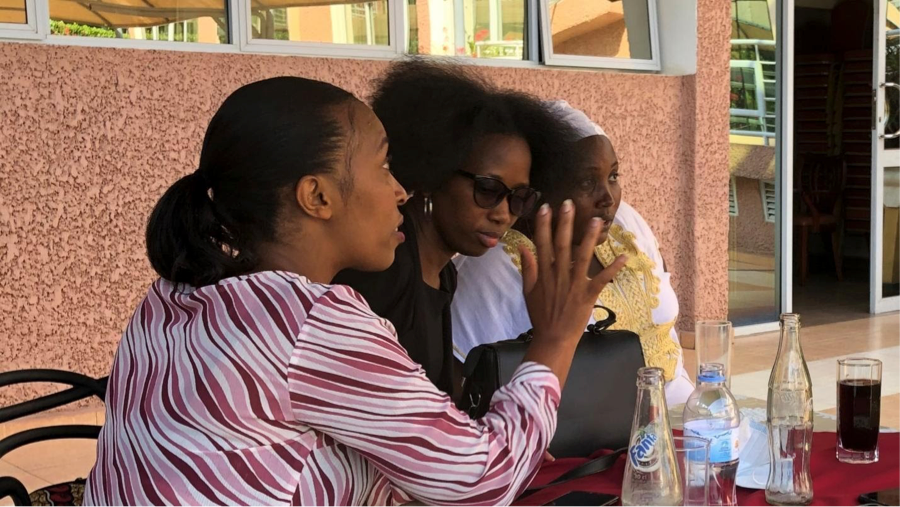
Journalists Yuyu and Marie Anne. Source: Fred Ndahira
This article is part of a series on COVID-19's impact in the East Africa region supported by WAN-IFRA Women in News, Social Impact Reporting Initiative.
